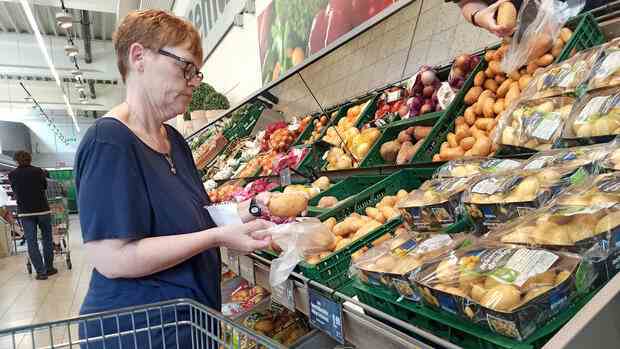This increases the pressure on the ECB and its President Christine Lagarde. The central bank is aiming for a price increase of two percent for the euro area. The data points to more persistent price pressures – which could force the ECB to raise interest rates more. Investors have already priced in a stronger tightening of monetary policy in recent weeks, which has led to price losses.
Thomas Gitzel, chief economist at VP Bank, sees the numbers as an “alarm signal”. The economist at the Swiss asset manager Pictet, Frederik Ducrozet, assumes that they are in favor of a tougher monetary policy. “Until there are early signs that underlying inflation is peaking, the ECB is unlikely to slow the pace of monetary tightening,” he says.
Ducrozet now sees the likelihood of another rate hike up by half a percentage point in May. The central bank has already clearly signaled a step of this magnitude for the March meeting.
Rise in energy prices slowing down
Another trend: the rise in energy prices, which was the main driver of inflation up until the summer of last year, is continuing to weaken. In February, energy prices rose 13.7 percent year-on-year. In October, the increase there was still 41.5 percent compared to the previous year.
On the other hand, so-called second-round effects, i.e. price increases as a reaction to past cost increases, mainly due to more expensive energy, are becoming increasingly apparent. Many industries are affected by this. For example, hotels and restaurants have to spend significantly more on electricity and gas and pass these higher costs on to customers.
Commerzbank economist Christoph Weil expects core inflation to peak in July and “will only decline slowly thereafter”. He assumes that the companies have now passed on a large part of the energy price-related increase in production costs to consumers. “But now a new wave of inflation is imminent with the strong rise in wages.” This would drive up the prices for services in particular.
Trade unions are increasingly pushing for higher wages, citing the higher cost of living. In Germany, for example, the Verdi services union is calling for a wage increase of at least 10.5 percent in the current wage round.
Lagarde hints at further steps
ECB chief economist Philip Lane expects wages to become “the primary driver of inflation over the next few years”. High core inflation is therefore the most important argument for advocates of tight monetary policy.
One of the most prominent is Bundesbank President Joachim Nagel. On Wednesday, before the inflation figures in Germany and the euro area were announced, he said that inflation was “stubborn” and that it had to be fought “robustly and persistently”. He also expects further “significant” interest rate hikes beyond March.
ECB President Christine Lagarde also made it clear on Spanish television on Thursday that further steps could follow. “At this point, it’s possible that we can continue down this path,” she said. “What is very certain is that we will do everything that is necessary to bring inflation back to two percent.” Lagarde had also signaled this determination at the most recent press conferences.
Investors have recently adjusted their expectations for interest rate developments in the euro area. They now assume that interest rates will remain at a high level for longer and expect more rate hikes. This was partly due to statements by ECB representatives.
Governing Board member Isabel Schnabel has warned that inflation in the euro area could prove to be more stubborn than the markets are currently pricing in. In addition, the economy reacts more slowly than before to interest rate increases. The ECB “may have to act more vigorously”.
The interest rate on deposits on the financial markets is currently 2.5 percent. At the beginning of February, a rate of 3.5 percent was priced in on the futures markets for the end of the year. It is now over 3.75 percent.
Several banks have also recently raised their forecasts for the peak in interest rates. The US bank Goldman Sachs sees this now at 3.75 percent, after previously expecting 3.5 percent. She now assumes that the ECB will raise interest rates again by half a percentage point in May.
More: Inflation in Germany remains at a high level
